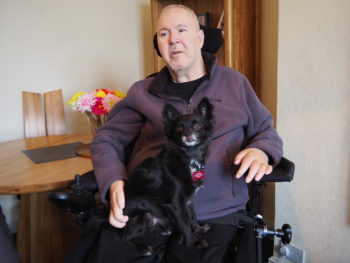
An application for judicial review of assisted dying laws brought by a severely disabled man, Paul Lamb, will be heard at the High Court in London today. Paul is being supported by Humanists UK in bringing his case.
On 2 October 2019 a judge refused Paul’s written application for judicial review. His renewed application will be heard orally.
Paul, 63 of Leeds, argues the current law – which prohibits any assistance under threat of up to fourteen years’ imprisonment – breaches his human rights, including Article 14 of the European Convention on Human Rights which protects against discrimination and Article 8 which protects the right to privacy and family life.
He argues the current laws are discriminatory against those with severe disabilities, because an able-bodied person would be able to end their own life if they wished, but the laws which make assisting suicide a criminal offence effectively prevent the severely disabled from doing so. Paul claims this puts severely disabled people at a disadvantage and the failure to make an exception for them is not justified.
In his application Paul claims the recent dismissal of other right to die cases should have no bearing on his own as his arguments are different from the others for example those of Mr Newby and Mr Conway. Paul is not able to end his life through the removal of medical equipment or treatment. Paul is not seeking to restrict his proposed changes to those who have to prove they have only six months to live and does not necessarily involve doctor-assisted suicide. Paul’s arguments centre on the legal issue of discrimination.
Paul was severely injured in a car accident in 1990 and has no function below his neck apart from limited movement in his right arm. He requires around the clock care and knows that, given his condition, he will inevitably need assistance to die.
Humanists UK Chief Executive Andrew Copson said: ’Paul lives in constant pain and is fighting for the right to be able to choose a compassionate ending if his health worsened and his suffering became too unbearable. We must support people’s autonomy and their right to control what happens to their own bodies – this is the essence of what it means to protect human dignity and prevent suffering. More than 90% of the British public now support a change in the law and several countries internationally have legalised assisted dying. Now really is the time to act and give people like Paul the compassion and dignity they deserve.’
Rosa Curling, solicitor from Leigh Day representing Mr Lamb, said: ’We believe Paul’s case is distinct from other cases that have been brought regarding the right to die and we look forward to presenting his full application for judicial review to the court.’
NOTES:
For further comment or information, please contact Humanists UK press manager Casey-Ann Seaniger at casey@humanists.uk or phone 020 7324 3078 or 07393 344293. Or contact Caroline Ivison Head of Media relations at Leigh Day at pressoffice@leighday.co.uk or 07775 713725.
Note to media: Paul is currently very unwell and, as a result, will be unable to attend the hearing or give any media interviews.
Read more about Humanists UK’s work on assisted dying.
Read more about Paul Lamb’s legal case.
Paul Lamb is represented by Rosa Curling and Erin Alcock of Leigh Day Solicitors, Philip Havers QC of 1 Crown Office, Adam Sandell of Matrix Chambers, Adam Straw of Doughty Street Chambers and Eesvan Krishnan of Blackstone Chambers. Ms Curling, Mr Havers, and Mr Sandell previously acted for the claimant known as ‘Martin’ during the 2014 Supreme Court case.
Humanists UK believes that individuals who are of sound mind but who are terminally ill or incurably suffering should have a right to decide to end their life at a time and in a manner of their choosing. We recognise that any assisted dying law must contain stringent safeguards, but the international evidence from countries where assisted dying is legal shows that safeguards can be effective.
Humanists UK is the national charity working on behalf of non-religious people. Powered by over 85,000 members and supporters, we advance free thinking and promote humanism to create a tolerant society where rational thinking and kindness prevail. We provide ceremonies, pastoral care, education, and support services benefitting over a million people every year and our campaigns advance humanist thinking on ethical issues, human rights, and equal treatment for all.
